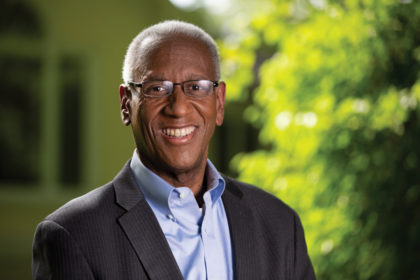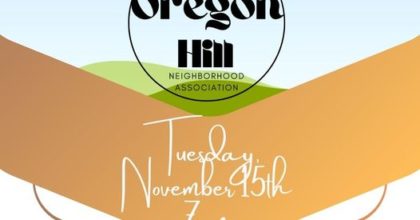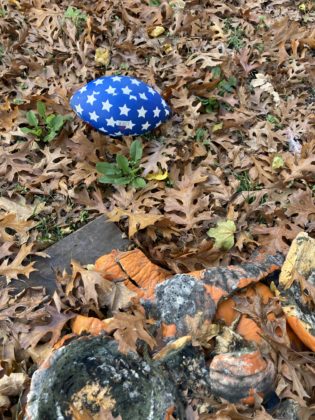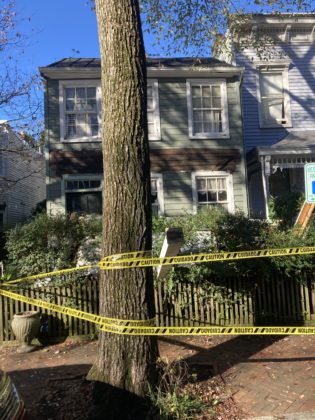
Many Oregon Hill residents were saddened to hear last night that our Congressman Donal McEachin has passed away after long illness.


Many Oregon Hill residents were saddened to hear last night that our Congressman Donal McEachin has passed away after long illness.

I am not a wealthy man. That said, sometimes you have to put your money where your mouth is.
While I don’t think money should equal speech (I support www.MoveToAmend.org), in this case, I am willing to make an exception.
Given the FAILURE of Richmond City Council to fully consider and debate ranked choice voting earlier this Fall season, I am upping the ante for local political reform.
I, Scott Burger, pledge to reward whichever Richmond university student government is the first among Richmond university student governments to conduct a campus wide election of student government officers using ranked choice voting and incorporate ranked choice voting into its constitution/bylaws with a $1,000 prize.
So, a couple of notes on this-
No stipulation on how the prize money, once awarded, is spent. Although one suggestion- maybe a giant pizza party, free for all students, with toppings decided by ranked choice voting (see https://www.rcv123.org)
This contest is eligible for Richmond university student governments, meaning University of Richmond SGA, Virginia Commonwealth University SGA, or Virginia Union University SGA.
Although I am a Green Party member and board member of Fair Vote Virginia, this contest is not in any way affiliated with those groups. I alone am responsible for holding this contest and rewarding the prize money.
And since it is my hard-earned money, I reserve the sole right to judge who qualifies first for the prize. I will also decide on the time and method of payment (despite the post photo, most likely a personal check). If I detect insincerity and/or lack of commitment, I also reserve the right to withhold the prize money.
Talk it over during the Thanksgiving holiday break. Remember, this city, state, and country need young people to lead.

This Wednesday is a “Red Wednesday”, which means trash and recycling pickup.
Please go over what can be recycled. Ideally, rolling recycling containers are stored and deployed in the back alleys along with trash cans. Please make sure you pick up containers after pickup tomorrow night.
If it seems like pickup did not happen, use this online form:
https://cvwma.com/programs/residential-recycling/recycling-service-request-form/
If you have not done so already, don’t forget to sign up for your Recycling Perks.
In order to take your recycling to the next level, read this: 10 ways to improve your recycling.
In recycling news, Richmond Magazine recently featured a story on new restaurant Kitchen33, which hopes to set a news standard for sustainability.
Excerpt:
The difference between styrofoam containers and sugar cane or bamboo containers, which Kitchen33 uses, is 8 cents per unit. “We’ve been cleaning up other restaurants’ trash for the last six years,” he says. “We would talk to a lot of restaurants about getting rid of single-use plastic, so with Kitchen33, it was our idea of what restaurants should be as far as being environmentally responsible.”

From email announcement:
Good evening OHNA members,
I look forward to seeing everyone Tuesday at 7pm for our monthly OHNA meeting. This meeting will be Zoom only. Our November meeting is scheduled one week earlier than usual to avoid conflict with next week’s holiday.
The Zoom link is provided below. This will allow for full remote participation.
I have attached to this email
1. the agenda for the 15 November meeting (also pasted in below),
2. the minutes for the October 2022 meeting, and
3. the 2022 meeting schedule.
We will be holding our annual OHNA officer elections at this meeting.
We look forward to seeing everyone Tuesday evening.
Thanks,
Bryan
Monthly Meeting Agenda
Tuesday 15 November 2022
7:00PM
This meeting will be by Zoom only.
Join Zoom Meeting (Log-in information redacted by editor, email OHNARva@gmail.com for it)
Welcome
• Treasurer’s Report
Community Updates:
1. Lt. Brian Robinson, City of Richmond Police Section Lt, 4th Precinct
2. Officer Luke Schrader, Police Liaison, VCU
3. Ms. Verenda Cobbs, VCU
4. Ms. Stephanie Lynch, 5th District Councilperson
5. Ms. Colette McEachin, Richmond Commonwealth’s Attorney
Updates:
1. Update on the fall festival, Saturday 22 October 2022
Continued Business
2. Proposed Amendments to the Richmond 300 Land Use Plan / Neighborhood Coalition Update
• This item passed unanimously by City Council on 27 June 2022
• The Planning Commission hearing on 18 July 2022 was informational only; no vote taken.
• Planning Commission voted on this issue at the 15 August 2022 meeting (1:30pm).
o Despite the fact that we had 47 letters in support, and none in opposition, and had several speakers in support, and none in opposition, the Planning Commission voted unanimously against our amendment.
o Next steps
3. Amphitheater planned for Tredegar Green.
· It is slated to seat 5,000 people and accommodate and additional 5,000 standing, as per our meeting with the developer’s representative. No additional parking is planned.
· When the previous amphitheater plan was proposed, the neighborhood raised questions about hours of operation, noise levels, and parking, none of which were ever answered.
o Applicant has not yet scheduled a meeting with OHNA
4. An SUP application has been filed with the City of Richmond for the demolition of 708 China Street, and its replacement with a building.
· The Zoning Committee met with the applicant, and asked them to reconsider demolition and incorporate the historic building into their new construction
· The applicant has not yet come back to the neighborhood with a revision
5. An SUP application has been filed with the City of Richmond for the construction of a two-family of 823 China Street, a vacant lot
· The Zoning Committee met with the applicant on 24 October 2022
· No objections from the committee. We will present this for a vote by the neighborhood at this meeting.
6. Traffic issues along Idlewood at Cherry and Pine Streets
· There have been a number of recent accidents at these two locations.
· These two intersections suffer from poor visibility and the high speed of cars exiting 195 east onto Idlewood.
New Business
7. Traffic issues from Richmond marathon.
· Any recommendations for the City for next year?
8. We will hold a holiday meeting in person on 27 December 2022
9. OHNA officer elections.
Bryan Clark Green, President
David Cary, Co-Vice-President
Jennifer Hancock, Co-Vice-President
Chris Hughes, Co-Vice-President
Harrison Moenich, Secretary
John Bolecek, Treasurer

Pine Street neighbor Stephenie Harrington is collecting toys and items at her house for RACC Foundation until December 5th, and invites neighbors to join her for the 17th Annual holiday party with live music by The BopCats
Saturday, Dec 3, 1pm-5pm, Basic City Beer Co- RVA.
TOYS for KIDS: new and unwrapped books, educational toys, bikes and scooters (helmets greatly appreciated), dolls, Barbie’s, sporting equipment, footballs, basketballs, soccer equipment, art supplies, games, puzzles, sleds, horns, and FIRE TRUCKS
PET ITEMS: towels, sheets, blankets, Nylabone brand dog treats, meat-flavored baby food, “pate” style canned cat food (gently used towels/sheets/blankets are acceptable, thank you!)

CobbleStore Vintage store has announced that they are throwing their first vintage market:
We’re teaming up with Smashed RVA and Last Pick Vintage to bring you a vintage market with a Good Burger themed menu from Smashed RVA to celebrate Small Business Saturday! That’s right! A menu based off the 1990’s cult classic movie Good Burger. Mondo Burgers, Ed Sauce, Orange Soda, the whole deal. Really excited to see what Smashed RVA comes up with. Vegan option will be available!
There will be 7 different vendors with handmade jewelry, hot sauce, women’s vintage, vintage military, and much more.
The event will take place in the parking lot directly next to CobbleStore Vintage located at 324 S Pine St, Richmond VA 23223 and will run from 12PM to 5PM. We will have some tables set up so you can hang out and eat between shopping with the vendors. Please share this event with friends!

It’s been a busy fall season here in the neighborhood. Many of us enjoyed the Halloween parade and the Richmond Marathon, and now we look ahead to the holidays.
While we had a relatively quiet Election Day, not all of us have been unscathed. A thunderstorm recently lead to a porch collapse on Pine Street.

Coming up, Recycling and November OHNA meeting and election of officers.
This Wednesday is a “Red Wednesday”, which means trash and recycling pickup.
Please go over what can be recycled. Ideally, rolling recycling containers are stored and deployed in the back alleys along with trash cans. Please make sure you pick up containers after pickup tomorrow night.
If it seems like pickup did not happen, use this online form:
https://cvwma.com/programs/residential-recycling/recycling-service-request-form/
If you have not done so already, don’t forget to sign up for your Recycling Perks.
In order to take your recycling to the next level, read this: 10 ways to improve your recycling.
In recycling news, a new Greenpeace report confirms suspicions about plastic recycling: Most plastic simply cannot be recycled, a new Greenpeace USA report concludes. Circular Claims Fall Flat Again, released October 24, finds that U.S. households generated an estimated 51 million tons of plastic waste in 2021, only 2.4 million tons of which was recycled.

China Street neighbor Manny Rios has announced that the the annual pre-Thanksgiving Oregon Hill soccer pickup game has ben scheduled for November 24th at 10 am – all skill levels welcome.
“Come and work up some sweat and your appetite on the soccer pitch! Good friends and great Memories!”
For more information, see the FaceBook event page.